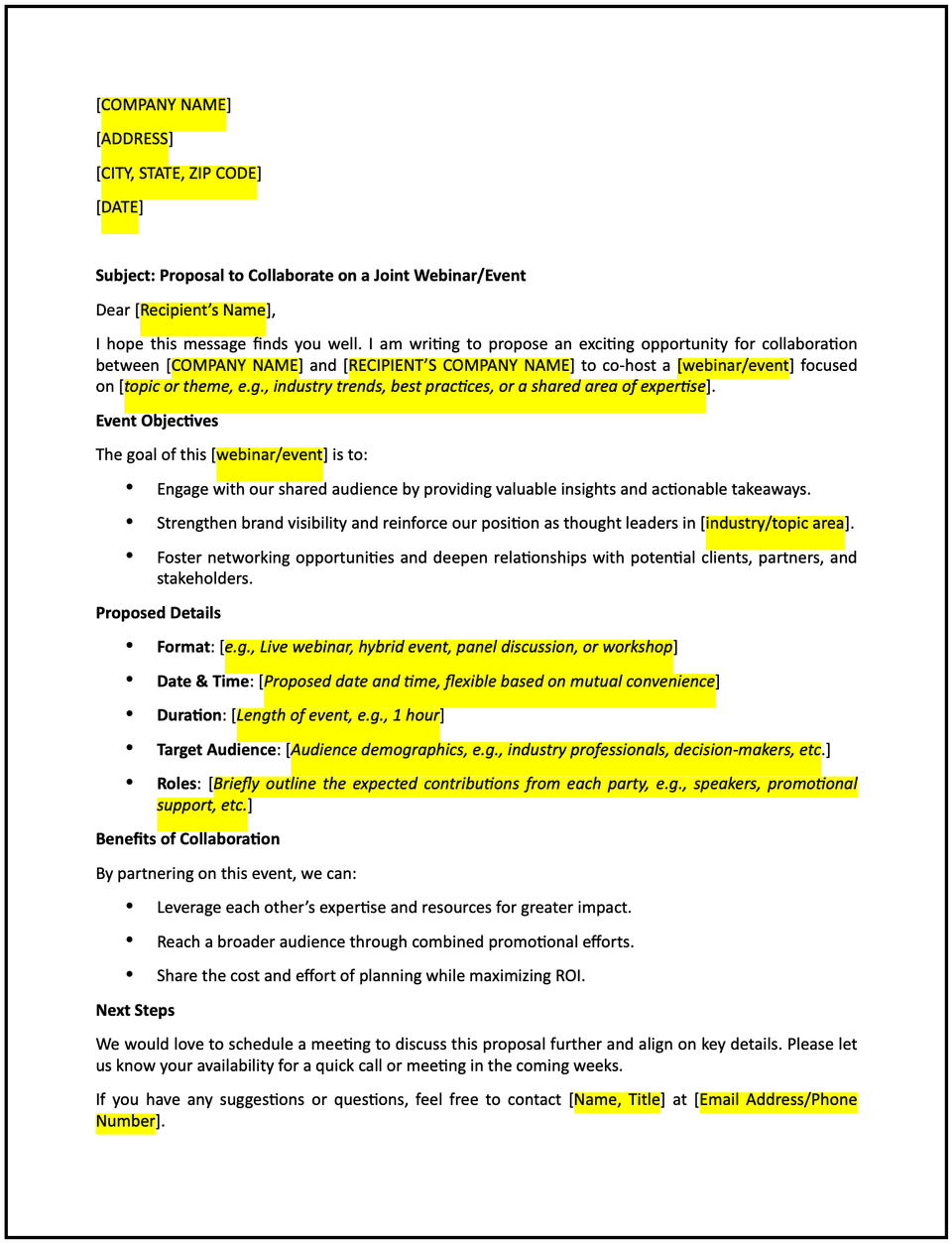Letter of proposal to host a joint webinar or event: Free template

Letter of proposal to host a joint webinar or event
A letter of proposal to host a joint webinar or event is a formal communication used to suggest a collaborative event with another organization, individual, or partner. This letter outlines the proposed event’s purpose, mutual benefits, and key details to encourage collaboration and foster a successful partnership.
How to use this letter of proposal to host a joint webinar or event
- Open with an introduction: Address the recipient respectfully and introduce your organization or brand, along with the purpose of the letter—to propose hosting a joint webinar or event.
- Highlight the opportunity: Briefly explain why a joint event is beneficial, referencing shared goals, target audiences, or synergies between your organizations.
- Outline the proposal: Clearly describe the type of event (e.g., webinar, workshop, panel discussion), its topic, format, and potential audience.
- Emphasize mutual benefits: Highlight how the collaboration can increase visibility, enhance credibility, or provide value to attendees.
- Include logistical details: Provide a preliminary timeline, platform (if virtual), and roles for each party in organizing the event.
- Invite collaboration: Encourage the recipient to share their ideas, suggest modifications, or co-create the agenda to ensure alignment.
- Provide a call to action: Request a meeting or response to discuss the proposal further and agree on next steps.
- Maintain a professional tone: Ensure the letter is clear, respectful, and focused on fostering partnership.
- Provide contact information: Include details for the recipient to reach out with questions or to arrange a discussion.
Benefits of using a letter of proposal to host a joint webinar or event
This letter provides a structured and professional way to initiate event collaborations while fostering trust and mutual success. Here’s how it helps:
- Promotes collaboration: A clear proposal demonstrates your commitment to working together for shared goals.
- Reflects professionalism: A well-crafted letter showcases your organization’s dedication to creating valuable events.
- Increases visibility: A joint event combines audiences and enhances exposure for both parties.
- Adds credibility: Collaborating with a trusted partner strengthens your brand’s reputation and industry presence.
- Streamlines communication: Clearly defining objectives and logistics reduces misunderstandings and sets the stage for success.
Tips for writing an effective letter of proposal to host a joint webinar or event
- Be specific: Clearly describe the event’s purpose, format, topic, and roles for each party.
- Use professional language: Maintain a respectful and engaging tone to encourage collaboration and trust.
- Provide context: Briefly explain your organization’s mission, audience, and why the partnership is mutually beneficial.
- Highlight benefits: Emphasize how the event can create value for attendees and both organizations.
- Include a call to action: Request a response and propose next steps to move the discussion forward.
- Keep it concise: Focus on the key points while ensuring the tone is professional and inviting.
Frequently asked questions (FAQs)
Q: What details should I include in this letter?
A: Include your organization’s introduction, the event type, proposed topic, logistical details, and a call to action.
Q: Should I personalize the letter?
A: Yes, tailoring the letter to the recipient’s organization and goals demonstrates attentiveness and builds rapport.
Q: Who typically sends this letter?
A: Marketing teams, event planners, or organizational leadership typically send this letter.
Q: How formal should this letter be?
A: The tone should be professional yet approachable, focusing on clarity and fostering collaboration.
Q: When should this letter be sent?
A: Send the letter well in advance of the proposed event date to allow time for planning and discussions.
Q: Can this letter include proposed dates or agendas?
A: Yes, including tentative dates or a draft agenda helps the recipient better understand the proposal.
Q: Is acknowledgment from the recipient required?
A: While not mandatory, requesting acknowledgment ensures the recipient is aware of and interested in the proposal.
This article contains general legal information and does not contain legal advice. Cobrief is not a law firm or a substitute for an attorney or law firm. The law is complex and changes often. For legal advice, please ask a lawyer.


